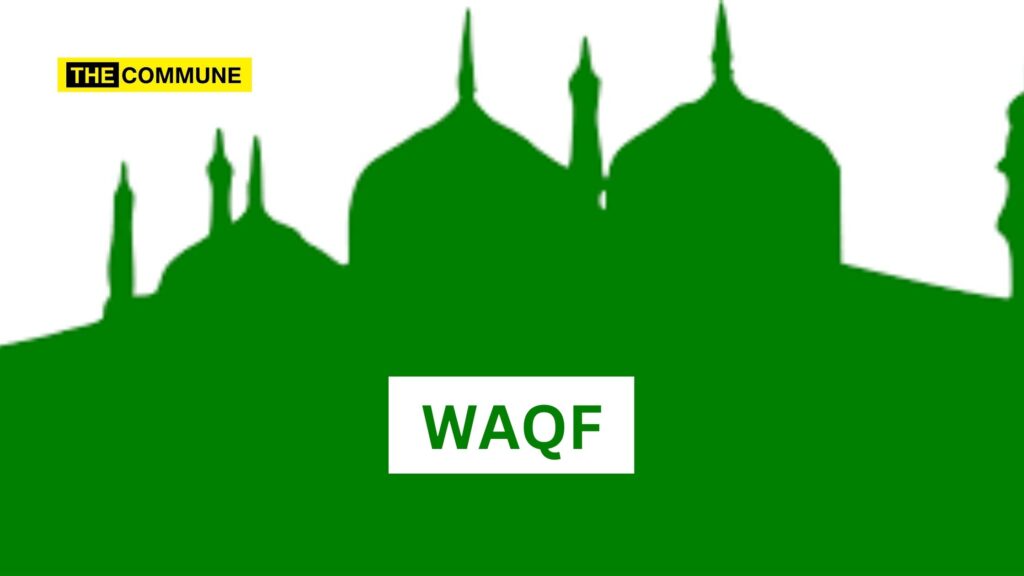Over the past 24-48 hours, the Waqf Board has claimed ownership of land in atleast 3 states in India. This has led to tensions to escalate across the 3 states viz, Maharashtra, Karnataka, and Telangana. The recent land claims by the Waqf Board have triggered disputes involving temple trustees, farmers, and residential communities, each challenging the board’s assertions of ownership.
Maharashtra: Dispute Over Land Near Kanifnath Temple In Ahmednagar
In Ahmednagar, Maharashtra, controversy erupted when the Waqf Board claimed ownership over 40 acres of land surrounding the Kanifnath Temple, asserting it belonged to a local dargah. The claim, which reportedly dates back to a 2005 registration under the Waqf Act, led to a confrontation with temple trustees who presented historical records to counter the Waqf Board’s assertion.
Temple trustee Shrihari Ambekar argued that the land was historically entrusted to a local family, with documentation from the pre-British era supporting the temple’s ownership. Ambekar further alleged that the 2005 Waqf registration violated procedural requirements, bypassing due notification to existing stakeholders. The Waqf Board’s installation of a sign claiming ownership has intensified the dispute, with temple trustees promising to continue their legal fight to retain the land.
Karnataka: Farmers Protest Land Designation In Vijayapura District
In Karnataka, nearly 1,200 acres of farmland in Vijayapura’s Honwada village have come under dispute after the Waqf Board issued notices asserting that these lands were tied to the Shah Aminuddin Dargah. According to local farmers, this claim is based on a 1974 government gazette but is being enforced with little regard for their ownership records. Farmers in Honwada, many of whom have held the land for generations, are outraged and vow to protest if the claims are not rescinded.
Vice President of the Honwada Gram Panchayat, Suneel Shankarappa Tudigal, condemned the notices as an overreach, pointing out that many affected farmers possess documentation proving ownership. In response to the backlash, Waqf Board officials clarified that if farmers could present valid ownership records, they would not pursue further action. Karnataka’s district in-charge Minister, M.B. Patil, addressed farmers’ concerns publicly, assuring them that any land erroneously marked as Waqf property would be corrected.
Telangana: Land Freeze In Malkajgiri Spurs Community Outrage
In Telangana’s Malkajgiri district, a recent Waqf Board declaration has frozen property transactions across 750 acres, affecting numerous residential neighborhoods. The decision by the Telangana Registration and Stamps Department to list these lands as Waqf properties—without prior notification or transparency—has sparked outrage among residents. Local leaders, including BJP MP Eatala Rajender, have denounced the move as a “draconian act,” while residents argue the board’s sudden claims threaten homes they have owned for decades.
The suspension of buying and selling across more than 100 survey numbers has created ripples of anxiety within the community. “The Waqf Board is trying to seize our hard-earned properties without justification,” one resident remarked. Local municipal corporator Cyanam Rajyalakshmi expressed solidarity with affected residents, pledging to oppose what she called an “unjust land grab.” National voices, such as VHP spokesperson Dr. Ravinuthala Shashidhar, have also condemned the decision, calling it an undue encroachment that unfairly targets Hindu families.
Waqf Land Claims – Pushing For A Secessionist Trend?
The recent land claims by the Waqf Board in southern Indian states have raised concerns that these moves may fuel secessionist sentiments in the region. Leaders and former intelligence officials warn that the Waqf’s extensive claims over properties—spanning private, temple, and agricultural lands across Karnataka, Kerala, and Tamil Nadu—could serve as a precursor to a larger push for autonomy or even a separate state that encompasses predominantly Muslim areas in these regions. Mustafa Mundupara, a regional leader, has publicly advocated for the creation of a “Malabar State” and, with the abrogation of Article 370, there is heightened apprehension about religiously motivated secessionist movements gaining traction.
Local leaders argue that the Waqf’s property claims are a form of land-grabbing that disproportionately impacts Hindu and Christian communities, adding to communal tensions. In Karnataka, for example, the recent Waqf claim has drawn sharp criticism and stoked fears that such actions might systematically displace non-Muslim communities. In Tamil Nadu, similar disputes are arising, with temple lands reportedly claimed by the Waqf, effectively stalling property sales and local development efforts.
Political analysts suggest that these controversies are likely to deepen regional divides. The Waqf Board’s actions are viewed as part of a broader strategy aimed at establishing an Islamic corridor, linking Muslim-majority areas across southern India. This perceived objective, combined with escalating land disputes, is driving calls for greater autonomy from certain factions, threatening to destabilize communal harmony and territorial unity in the region.
(With inputs from Daily Pioneer)
Subscribe to our channels on Telegram, WhatsApp, and Instagram and get the best stories of the day delivered to you personally.

